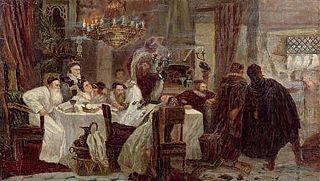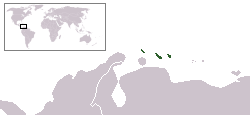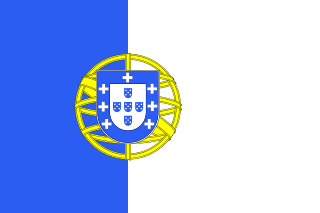
In history, a colony is a territory under the immediate complete political control and occupied by settlers of a state, distinct from the home territory of the sovereign. For colonies in antiquity, city-states would often found their own colonies. Some colonies were historically countries, while others were territories without definite statehood from their inception.
The term Hispanic broadly refers to the people, nations, and cultures that have a historical link to the Spanish language or the country of Spain, depending on the context.

Marranos were Jews living in the Iberian Peninsula who converted or were forced to convert to Christianity during the Middle Ages, yet continued to practice Judaism in secret.

A converso, "a convert", was a Jew who converted to Roman Catholicism in Spain or Portugal, particularly during the 14th and 15th centuries, or one of their descendants.

Sangria is an alcoholic beverage. A punch, the sangria traditionally consists of red wine and chopped fruit, often with other ingredients such as orange juice or brandy.

Papiamento or Papiamentu is a creole language spoken in the Dutch Caribbean. It is the most-widely spoken language on the Caribbean ABC islands, having official status in Aruba and Curaçao. Papiamento is also a recognized language in the Dutch public bodies of Bonaire, Sint-Eustatius and Saba.
Ruy López de Villalobos was a Spanish explorer who sailed the Pacific from Mexico to establish a permanent foothold for Spain in the East Indies, which was near the Line of Demarcation between Spain and Portugal according to the Treaty of Zaragoza in 1529. Villalobos gave the Philippines their name, after calling them Las Islas Filipinas in honor of Philip of Austria, the Prince of Asturias at the time, who later became Philip II of Spain. In 1542 he also discovered a Pacific group of islands, most likely Hawaii, but the Spaniard kept the discovery secret.

Portuguese people are a Romance ethnic group indigenous to Portugal that share a common Portuguese culture and speak Portuguese. Their predominant religion is Christianity, mainly Roman Catholicism, though vast segments of the population, especially the younger generations, have no religious affiliation. Historically, the Portuguese people's heritage includes the pre-Celts and Celts. A number of Portuguese descend from converted Jewish and North Africans as a result of the Moorish occupation of the Iberian Peninsula.

Slavery in the Spanish American colonies was an economic and social institution central to the operation of the Spanish Empire – it bound Africans and indigenous people to a relationship of colonial exploitation. Spanish colonists provided the Americas with a colonial precedent for slavery; however, early on opposition from the enslaved Indians and influential Spaniards moved the Crown to limit the bondage of indigenous people, and initiated debates that challenged the idea of slavery based on race. Spaniards regarded some indigenous people as tribute under the encomienda system during the late 1400s and part of the 1500s.

The English Armada, also known as the Counter Armada or the Drake-Norris Expedition, was a fleet of warships sent to Spain by Queen Elizabeth I of England in 1589, during the undeclared Anglo-Spanish War (1585–1604) and the Eighty Years' War. It was led by Sir Francis Drake as admiral and Sir John Norreys as general, and failed to drive home the advantage England had won upon the destruction of the Spanish Armada in the previous year. The Spanish victory marked a revival of Philip II's naval power through the next decade.
Martin Andrew Sharp Hume, born Martin Andrew Sharp, was an English historian, long a resident in Spain.
A Captaincy is a historical administrative division of the former Spanish and Portuguese colonial empires. It was instituted as a method of organization, directly associated with the home-rule administrations of medieval feudal governments in which the monarch delimited territories for colonization that were administered by men of confidence.
The 4 x 100 metres relay at the 1987 World Championships in Athletics was held at the Stadio Olimpico on September 5 and September 6.

Greater Portugal, also known as Portugalicia, is a proposed union of the Portuguese-speaking territories including the autonomous region of Galicia, the Eonavian region, the territory of Olivença, and many villages along the Portugal-Spain border that speak any kind of Galician-Portuguese dialect, such as the Fala language.

Évora is a city and a municipality in Portugal. The population in 2011 was 56,596, in an area of 1307.08 km². It is the seat of the Évora District. The present Mayor is Carlos Pinto de Sá of the CDU coalition. The municipal holiday is 29 June.
The ancestry of modern Iberians is consistent with the geographical situation of the Iberian Peninsula in the south-west corner of Europe. The large predominance of Y-Chromosome Haplogroup R1b, common throughout Western Europe, is the result of Central European invaders during the Bronze Age, making the Spanish and Portuguese population closely related to others from Western Europe. Similar to Sardinia and unlike the Balkans and Italy, Iberia was shielded from settlement from the Bosporus and Caucasus region by its western geographic location, and its low level of Western Asian admixture probably arrived during the Roman period. Later historical Eastern Mediterranean and Middle Eastern genetic contribution to the Iberia gene-pool was also significant, driven by Phoenicians, Greeks, Carthaginians, Jews and Levantine Arabs.
William Walton (1784–1857) was an English writer on Spain and Portugal.
The Holy Queen is a 1947 Spanish-Portuguese historical drama film starring Maruchi Fresno, Antonio Vilar and Luis Peña. Separate Spanish and Portuguese versions were filmed with the Spanish directed by Rafael Gil and the Portuguese by Henrique Campos and Aníbal Contreiras. It was part of a popular group of Spanish costume films made in the late 1940s.

The Battle of Marvão was a military action that took place during the Fantastic War and the Anglo-Spanish War and was part of the attempted Spanish and French invasion of Portugal in late 1762. A large Spanish force attacked the castle town of Marvão but was repelled and defeated by an Anglo Portuguese force under the command of Captain Thomas Browne.










